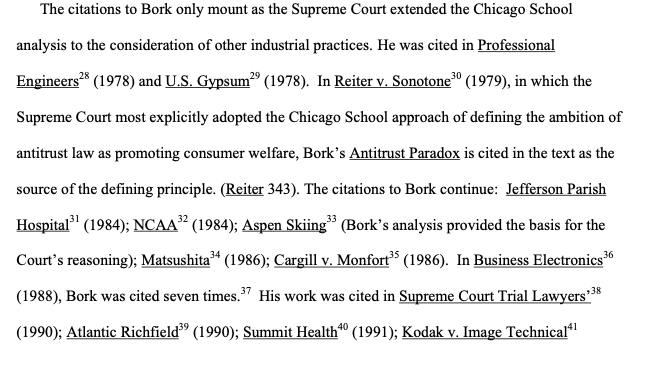
1. There's an important debate w/in the Federalist Society over the conservative legal movement. The alliance between social conservatives and libertarians is breaking down. A few observations about this wonderful @jacklgoldsmith essay on the tension. libertiesjournal.com/now-showing/th…
2. My read, as an outsider to this debate, is that Scalia's view of Chevron and the regulatory state are a fulcrum for debate. Scalia expanded the power of the executive branch from the 1980s-2000. But bc of Obama's actions, libertarians are now fighting to overturn Chevron.
3. I'm not an expert here. But I suspect this debate skips over a key part of the conservative legal movement, which was Bork/Scalia's erosion of the anti-monopoly tradition in American law. Trinko - which got rid of Section 2 claims - is a useful and consequential decision here.
4. Here's Scalia in Trinko: "The mere possession of monopoly power, and the concomitant charging of monopoly prices, is not only not unlawful; it is an important element of the free-market system."
This notion makes an utter mockery of the idea of originalism/textualism.
This notion makes an utter mockery of the idea of originalism/textualism.
5. As George Priest notes, in the 1960s/1970s, Robert Bork made intentional strategic choices to *distort* legal history so as to undermine the Sherman Act and the will of Congress. This was explicit. Bork moved power to judges from Congress in contravention of plain statute.
6. The reason this isn't apparent in FedSec debates is because FedSoc emerged in the early 1980s, after Bork and Scalia had *already* won the debate over the legal framework for our political economy. Trinko was a logical endpoint. 

7. Bork's law and economics movement won the hearts of the elite progressive academic world and the economics world in the 70s. Here's George Stigler: "By 1980 there remained scarcely a trace of the old antimonopoly framework in the economic literature." theguardian.com/commentisfree/…
8. FedSoc started in 1982. So debates over Chevron and social conservative questions happen without being tethered to the broader law and economics pro-monopoly project from which FedSoc came. Debating societies don't focus on settled questions; monopoly was a settled question.
9. Today it's not. Big tech dominance is blowing up the assumptions on which FedSoc fusionism is based. You simply cannot be a social conservative and tolerate perceived progressive monopolies like Google. But you can't be a libertarian and accept antitrust to break up Google.
10. It's more than just big tech, of course. Chinese aggressive, the financial crisis, and the broad collapse of neoliberalism and expertise is undermining the elitist assumptions of the legal academy in general.
11. A whole series of decisions, from Matsushita, Linkline, Amex, etc, have structured a political economy to enable the consolidation of power in the hands of a few dominant actors in our economy. mattstoller.substack.com/p/will-trumps-…
11. The fundamental problem is that FedSec and the conservative legal academy, because Bork, et al eliminated their conservative anti-monopoly tradition, have no way to talk about the problem of *private power,* which is basically state power in another guise.
12. That's why anti-monopoly arguments are both intellectually vibrant, and a challenge to the judge-centered philosophy of FedSoc and legal liberalism. It's why Congress is once again becoming an interesting place for political debate and policymaking. nytimes.com/2020/10/06/tec…
13. In other words, FedSoc is under intellectual strain but not because its ostensible ideological opponent - the American Constitution Society - matters. ACS has no content and is funded by big tech, just like FedSoc. The force behind this tension is the anti-monopoly movement.
14. I suspect FedSec will change. Anti-monopolism doesn't fit anywhere neatly in the political spectrum but is a foundational American tradition. I hope conservative legal scholars begin to rethink their assumptions about political economy, beyond just Chevron.
15. I'm sure I've gotten a bunchy of stuff wrong and made some egregious assumptions. So apologies in advance fo that. But that's my view, as an outsider to the conservative legal tradition.
• • •
Missing some Tweet in this thread? You can try to
force a refresh


